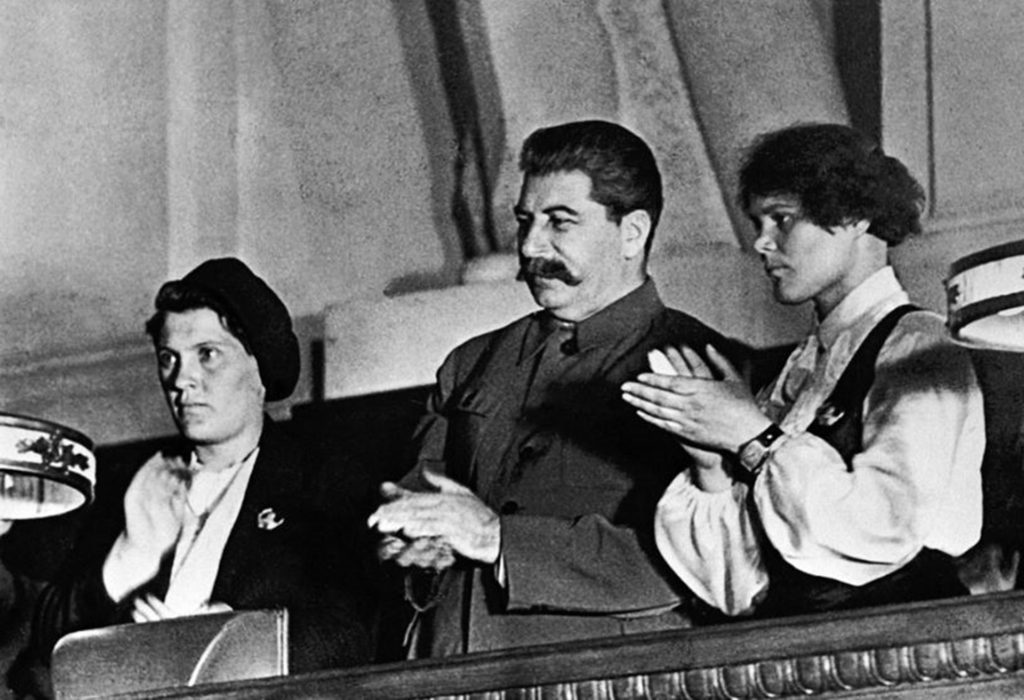
There is plenty of anecdotal evidence that communism leads to tyranny. Mention the countries North Korea, Cuba, the Soviet Union, Mao Tse Tung’s China, East Germany, and Venezuela, and most people immediately think of an oppressed population with almost no economic opportunity and no political freedom. The words communist dictatorship roll off the tongue like the two words have gone together forever. In fact, in an extreme irony, communism, ostensibly the most egalitarian form of government, in two cases led to the least egalitarian form of government: royalty or the rule of one family over time. The Kim family in North Korea and the Castros in Cuba have been ruling their countries like the kings and queens of old for some time.
Sometimes it is argued that the personalities involved lead to tyranny, not communism or socialism. Joseph Stalin, Mao Tse Tung, Fidel Castro, Erich Honecker, and Pol Pot are all bad people, but the personalities at the top matter little. Once a communist form of government is established, tyranny is the only result, regardless of which government official Game of Thrones’d their way to the top. Let’s examine the causal links that make communism a living hell for the people who have to live with it.
A Government That Is Giving You Things Can Take Them Away
The good news is you are entitled to housing, education, health care, and food. But that doesn’t mean people no longer have to work. The Soviet Constitution of 1936-Article 12 stated that “Labor in USSR is a duty and honorable obligation of each able citizen according to the principle: ‘Those who don’t work—don’t eat.’”
If you persisted in demanding your right not to work, you wound up in the gulag, so thank God you live in a free enterprise, democratic society.
The real issue that needs to be addressed here is that a government that controls everything can quash dissent by changing the economic situation of anyone who is pointing out their defects or is involved with the opposition. In a communist society, all jobs, all levels of education, the national police, the medical system, the judicial system, the electoral system, the housing stock, the food distribution system, the military, the press, and all forms of transportation are controlled by the central government.
Write an insightful article about how a local government official is making a huge mistake (if you can find a computer to write it on), and you may find your apartment changed to the worst one available in a city where you don’t want to live. You could be reassigned from the job you trained years to get. For those of you who think the government using the medical system to advance its own interests is the fevered paranoia of a deranged libertarian, I would remind you that the Hong Kong protestors have developed a separate medical network rather than use public hospitals.
Socialism and Communism Are Bad Economics That Must be Implemented by Government Force
When most of us interface with the outside world, we expect the highest possible pay for the work we do, and when we buy things, we expect the highest quality at the lowest possible price. Economics adds up those personal tendencies over millions of people in large, complex societies and comes up with a few simple rules that describe economic behavior. Supply and demand, marginal revenue and marginal cost, the theory of money, and specialization and exchange are really just simple rules that take all people’s actions and abilities into account and arrive at a solution that balances the overall societal equation.
Communists and socialists don’t like these simple economic rules and come up with their own, such as “from each according to his ability, to each according to his needs” (your needs are generally unlimited), which conflicts with human nature. When you implement policies that conflict with human nature, you have to use force to implement them.
One example of arbitrary socialist economics is Venezuelan President Nicolas Maduro’s drastic intervention in the electronics businesses of Venezuela in 2013. The government of Venezuela basically arrested the managers of one electronics store chain and forced the company to sell its products at lower prices. A few people got a cheap television on a one-time basis thanks to coercive government intervention, but you can bet that any ability to buy quality electronics at a good price in Venezuela is now gone.
A more serious example of communist economics is the Soviet farm collectivization of the 1930s. All the private, family-owned farms of the Soviet Union were converted to large collectivized farms. Stalin privately admitted to Churchill that 10 million people died, either from starvation or resistance to the forced farm collectivization. With a communist dictatorship, when a leader goes off the rails, there are no moderating forces that bring compromise or allow negotiation for alternative paths to lead a society toward its goals.
Every person who works in a communist society is paid by the government and knows they will be paid whether the organization they are working for provides goods or services to customers or not. This is very different than a society where most companies are private and employees know that if the company or the part of the company they work for doesn’t sell products that pay the companies expenses, they won’t be employed anymore. A communist society also has no private company competition to provide improved, cheaper, and higher quality goods and services.
A communist society’s productivity is a mere fraction of the productivity of an economy based on capitalism and free enterprise. The work ethic deteriorated so severely in the Soviet Union that a saying began circulating among the workers: “They pretend to pay us, and we pretend to work.” For a society to operate at an economic level much lower than its potential for generations is a loss that can never be regained.
Local versus National Police
One great defender of liberty in the United States that never gets much credit is your local police department. They enforce the laws we all care about—murder, assault, robbery—but they report no higher than the local mayor or county supervisor and are paid for by local taxes.
Communist societies are very top-heavy. They all have national-level police departments with ominous-sounding names that enforce the one true ideology over the entire country. In many communist countries, these national-level police forces turn family members against each other by asking children to turn in their parents if they say or do something against the government. One phone call seals your fate if you are a dissenter or independent thinker who is questioning how the government is doing things.
To think about this concretely, imagine some high-level government official in the United States said another political party needed to be eradicated by force and/or locked up in prison. They’d have to get the law passed and then get thousands of local police departments to enforce it—a daunting task. Decentralized power is a power that defends liberty.
Socialism Can Lead to Communism
Socialism is communism-lite. They believe in nationalizing some industries and or important societal functions but not all. Socialists will usually nationalize utilities, transportation, and large industries that tend to have labor problems. Here, the personalities involved matter a lot. Socialist governments either respect the prior governmental rules of free elections, separation of powers, and individual choice, or they push for complete government control of everything by their political party and end up allowing no dissenting political parties or individuals.
To understand whether socialism leads to communism, we will study two cases. The first case is Britain after WWII when socialist parties were elected to national political office. The second case is Venezuela, where Hugo Chavez was elected president in 1999 on a socialist platform.
These post-war British socialists took it pretty seriously. They nationalized coal, electricity, steel, and the railways and set up the National Health Service to provide government-run health care. Farms and grocery stores were allowed to be private, and the British electoral system was left to allow free and fair elections. After a number of years, the British economy performed poorly under socialism, and the British people elected politicians who believed in free enterprise and turned things around. Socialism doesn’t always lead to communism, and Britain pulled back from the brink when they saw that the socialist promise led to everyone being worse off.
In Venezuela, the democratically elected Chavistas pushed for governmental control and brought in Cuban intelligence agents to assist them in quashing dissent and controlling the population. Venezuela had a special problem in that the government tried to force businesses into selling goods and services at a loss, implemented draconian currency controls, and were then surprised when the businesses stopped operating. The result in Venezuela was that stores had no goods on their shelves, hospitals had no medicines or machines that worked, and ordinary people took to looking through trash for food. Various political maneuvers were implemented by the Chavistas, the legislature was restructured, the judiciary was stacked, and the electoral system was compromised.
Now, any political avenue for changing the government in Venezuela is gone, and they have the very dictatorship that characterizes communist societies, along with a broken economy that works very poorly, even by communist standards. If you want to implement communism, you start up mass production of staples, implement rationing, and wink at the black markets that spring up. In Venezuela, the socialists pushed their way through to dictatorship and tyranny, and a complete economic breakdown was the result.
Most Politicians Will Use the Power at Their Disposal to Protect Their Interests
As I’ve said before, a communist society controls almost every personal, educational, political, and economic aspect of society. When faced with a government that has all those levers of control, you can be the toughest, meanest, smartest person and have people who agree with you—and your chance of changing the people in charge of the government is very low.
Once the communist party in any given country has command over almost every control point, they all seem to have enough competence to use that authority to stay in power. Someone joked to me once that communism is the Hotel California of political systems—once you are in it, you can never leave. I can think of very few cases where “the people” overthrew a communist government. When a communist government moves on to a more open, pluralistic society, it is almost always because the people at the top decide communism is a bad idea and it is time to move on.
Gorbachev opened the door, and communism fell in the Soviet Union. When communism fell in the Soviet Union, the countries in Eastern Europe that had communism forced on them threw off that yoke. In China, the people at the top decided to allow some free enterprise and individual opportunity to spring up while not giving up political control.
What a Healthy Society Looks Like
A healthy society proactively avoids concentrating all power and resources in one party or person. This is more than just having multiple political parties and elections. It is the deliberate structure of society so that layers of local government, private companies, private or local educational institutions, civic organizations, judicial and police systems, individuals with personal wealth, non-profits, and religious organizations act as a brake on any party or person that goes off the rails and attempts to implement a dictatorship over society as a whole. A healthy society has private businesses that have to serve customers to stay in business.
In a healthy society, politicians are given power relating only to their function: legislating, performing legal judgments, or managing a very specific, well-defined part of the government. Checks and balances with other offices of government are implemented to further reduce the power of government officials. The next time you get angry at the person your fellow voters put into office, remember that limited government is the tool that makes it so that leader can do fewer things that affect your life.
The siren song of socialism and communism is alluring. Perhaps it is human nature that we want to be taken care of in all circumstances and be assured that no other person has material circumstances much better than our own. But the record is crystal clear. Socialism and communism lead to underperforming economies, loss of individual opportunity for generations, equality implemented by everyone being poor except the party apparatchiks, lack of innovation and progress, and incredible political and religious oppression. The next time you vote, look past the siren song and vote for someone who understands where freedom and liberty really come from.
Thomas Gordon is a Silicon Valley Software Engineer with extensive UCLA Economics training who has blogged on financial matters as The Market Flash on Seeking Alpha. Twitter tag: @flash7gordon
This article was originally published on FEE.org. Read the original article.



